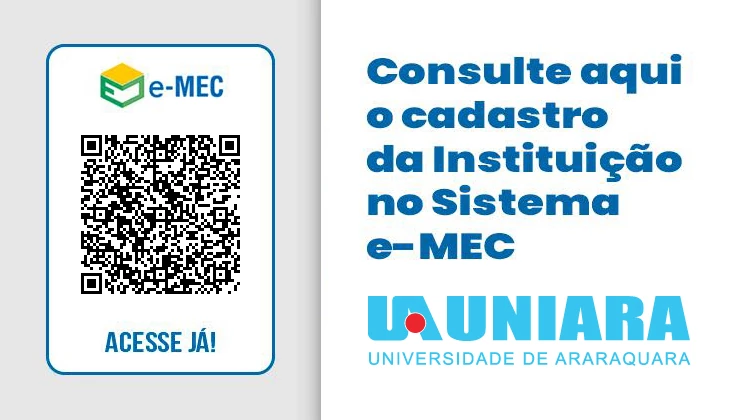About Conflict Management
Conflict Management, as a specialty foundation for stricto sensu undergraduate courses, is still an incipient topic in the Brazilian scenario. Conflict Management has an eminently practical nature and carries great potential for exploration in applied research, as is the nature of stricto sensu undergraduate professional courses. Thus, it is only natural that courses with a professional orientation should emerge since conflict management explores the frontiers of Law as an applied science. Since professional undergraduate courses are still largely incipient, the focus on the nature of the problems and processes of conflict presents ample space for studies and research, but mainly for more efficient solution proposals. On the other hand, the incipience, and the need for maturity of professional master`s degrees have highlighted the presence, in the country, of only two professional master`s programs in Law aligned with the theme of conflict theory. One of these programs is the PMPD-GC of the University of Araraquara, in the state of São Paulo. The other is offered by the University of Fortaleza - UNIFOR, in the state of Ceará. Thus, although conflict theory is not new, professional master`s degrees in conflict management are still recent and therefore have great professional interest and possibilities for expansion.
The PMPD-GC of Uniara has an area of concentration in Law as an applied science, with a focus on conflict management. It aims to qualify, through the development of specific skills, legal professionals in the fundamentals of conflict issues in their professional practices. In this context, space is opened for studies in two distinct platforms: the traditional judicial route, characterized by the judgment of disputes through heterocomposite means; and the extrajudicial route, characterized by the resolution of conflicts through consensual self-compositional means.
In the first platform, research and investigations focus on procedural solutions that involve normal judicial procedures. For example, voluntary conciliations provided for in judicial proceedings, such as labor proceedings, simplify the adjudication and sentencing process in the judiciary. Other conflict resolution formats focus on process efficiency and focus on the massive use of technology in the trial and sentencing process, using artificial intelligence robots. The other platform groups together conflict resolution solutions that use alternative methods to resolve conflicts. This platform focuses on the dejudicialization of legal acts that lead to conflict resolution, through mediation, conciliation, negotiation, and arbitration. On this platform, administrative procedures are essential to speed up processes, reduce their costs for citizens and, at the same time, ensure greater social pacification, by linking their solutions to the consensus of the parties. In the PMPD-GC of Uniara, these platforms are associated with the program`s research lines. The first platform supports the research line: Judiciary and Conflict Management. The second platform supports the research line: Dejudicialization and Conflict Resolution Models.
Conflict theory had its first systemic thinker in Karl Marx. The Marxist perspective defines conflict as the struggle between social groups due to differences and interests over resources and power. The solution to the conflict would be the seizure of power, to redistribute scarce resources. For these theorists, conflict is necessary because it induces structural transformations in society. A few decades later, the Chicago School opposed this view, defending the theory of conflict as a result of urban social disorganization. Unequal economic and social conditions cause conflict, which would lead to crime.” Conflict arises in individuals due to dissatisfaction with poorly or unfairly distributed social structures. The solution would not lie in the struggle for power to redistribute resources, but in the reorganization of society through social control to prevent crime. Modern conflict theory, however, considers it a phenomenon of individual demands, associated with positions of personal intransigence. That is, individuals do not abandon their demands because of empathetic considerations for other people`s causes, but rather intensify them. This is where conflict arises. In this situation, the solution may take different paths. It may be compulsory, by judicial sentence. Or, it may be negotiable, mediated or conciliated, depending on the degree of compromise or elasticity of demands among those in conflict. Thus, conflict can cease to be a phenomenon that is negative in nature, that is, a fight for the old, and become an opportunity to build the new.
It is within this context that the proposal for the Professional Master`s Degree in Law and Conflict Management fits in. The program is based on the premise that conflict, as a problem to be solved in the modern concept, is an opportunity for useful solutions to the construction of society. More than that, conflicts constitute the substrate of the actions that integrate the legitimate functions of Law. Divergent demands of individuals, the origin of conflicts, are only reconciled when the parties are convinced that justice is due to them. Thus, in the end, it becomes, in fact, a question of application, or conversely, of access, to justice. Only in this way can societies grow and improve their structures, since their energy will be focused on their improvement, not dissipated in endless disputes.
Observing this scenario, the University of Araraquara proposes a program with an innovative structuring methodological path for the context of legal practice. Some reasons justify these particularities. Firstly, the program is aimed at the public most involved in conflict resolution practices: legal practitioners (in the broadest sense). For this reason, it was designed in a professional format, that is, with a focus on applied legal research. Secondly, the program would have to deal with conflict management in its concept or nature, not as a product. Conceptually, managing a conflict means generating a solution and scientifically demonstrating its validity or feasibility. Thus, the program developed its own research methodological model, based on the Design Science Research (DSR) protocol. In its platform, the model considers three basic elements on which the candidate develops his/her dissertation: a problem, a solution to this problem, and an artifact, which embodies the solution in judicial practice.
The program model, therefore, considers conflict problems in legal practice as its substrate. For each problem under study, the model requires a viable solution, to be demonstrated through a scientific research method. The solution must then be implemented – made useful – to operators, through an artifact (guide, script, model, technology, bill, draft provision, etc.), applicable in the context of legal practice.
In this way, regardless of the program`s research line – Judiciary and Conflict Management, or Dejudicialization and Conflict Resolution Models – the methodological model supports any solution from the different research lines. In the judiciary research line, solutions that speed up the trial and improve sentencing are linked to the massive use of smart technologies, such as AI and Blockchain, for example. In research in the Dejudicialization line, solutions are linked to substitutes for traditional trial processes, by transfer to Public Offices, for example, or by transfer to litigants, via alternative consensual methods of conflict resolution. Both are important and decisive strategic paths for conflict resolution. Since the method supports the validity of solutions using scientific methods, the model guarantees the non-falsifiability of the results. Thus, whether in the context of solutions that increase the speed of the judiciary or in the context of solutions that promote extrajudicial solutions, each research associated with the respective master`s dissertation always generates a solution with the respective instrument that directs and guarantees the possibility of implementing the solutions in practice.
Uniara - Universidade de Araraquara / Rua Carlos Gomes, 1338, Centro / Araraquara-SP / CEP 14801-340 / 16 3301.7100 (Geral) / 0800 55 65 88 (Vestibular)









